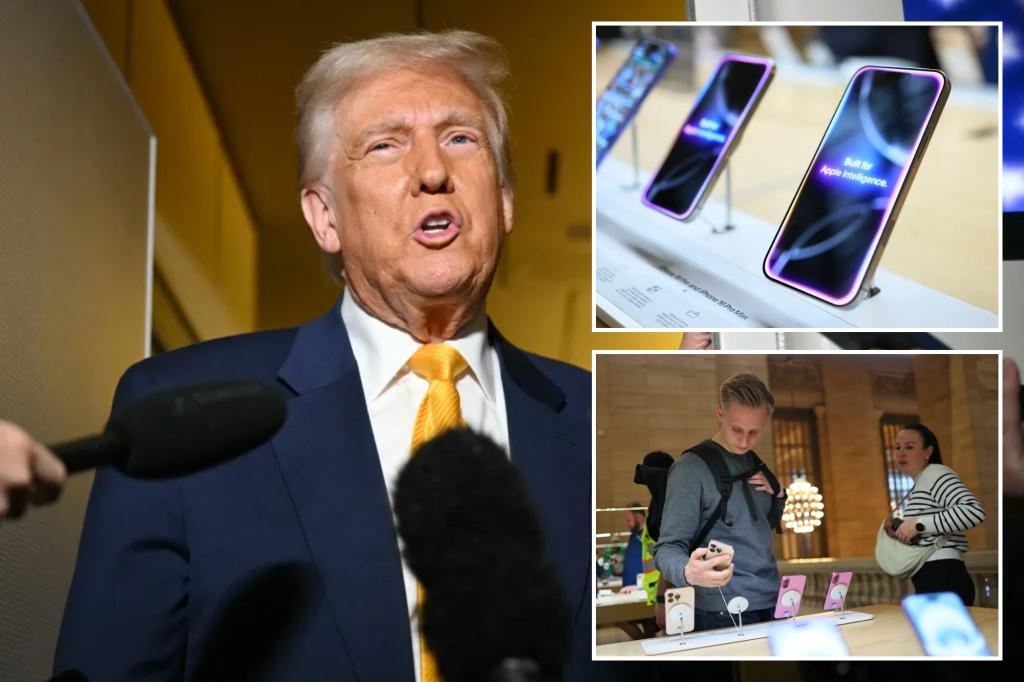In the ongoing saga of the US-China trade tensions, a new development has sent shockwaves through the global electronics market. According to a recent report from the New York Post, former President Donald Trump has made a bold statement, ruling out any exemptions for iPhones and other Chinese-made electronics from incoming tariffs. This move is set to have far-reaching implications for both consumers and manufacturers, potentially upending the status quo in the highly competitive tech industry.

Trump’s Tariff Revamp: Implications for Chinese-Made Electronics
President Trump’s recent announcement has put to rest any speculation about tariff exemptions for iPhones and other Chinese-made electronic devices. In a statement on Truth Social, Trump emphasized that “NOBODY is getting ‘off the hook'” and that new duties are coming. This move is set to have significant implications for the electronics industry, particularly for companies like Apple, which relies heavily on China for its manufacturing needs.
Tariff Exemptions and the Fallout
The initial ruling filed by Trump’s team on Friday seemed to grant a reprieve to Apple and other consumer electronics makers, who were facing tariffs of up to 145% under Trump’s sweeping new rules. However, Trump’s subsequent clarification on Sunday revealed that these products are still subject to the existing 20% fentanyl tariffs and will soon be moved to a different tariff “bucket.”
This sudden shift in policy has left many investors and consumers reeling. Apple CEO Tim Cook, who has courted close relations with Trump, may need to reassess his company’s pricing strategy in light of these new tariffs. With over 80% of Apple products assembled in China, according to data from Evercore ISI, the company may need to consider alternative manufacturing options to mitigate the impact of these tariffs.
The 90-Day Pause
Last Wednesday, Trump announced a 90-day pause in the implementation of his customized “reciprocal” tariff rates. This move was seen as a temporary reprieve for companies like Apple, but Trump’s subsequent clarification on Sunday suggests that this pause may not be as significant as initially thought.
Commerce Secretary Howard Lutnick explained that electronics being imported from China will soon face their own unique tariff, which will be part of the semiconductor tariffs coming in the next month or two. This means that companies like Apple will still face significant tariff hurdles, even if they are exempt from the reciprocal tariffs.
Market Reactions
The uncertainty surrounding these tariffs has led to significant market reactions. Investors are increasingly wary of the impact of these tariffs on companies like Apple, which could see its prices rise significantly. The consumer electronics industry as a whole is also likely to be affected, as companies struggle to absorb the costs of these tariffs.
New Tariffs on the Horizon
Trump’s announcement on Sunday also hinted at new tariffs on the horizon, specifically targeting semiconductors and the broader electronics supply chain.
Semiconductor Tariffs
The semiconductor tariffs, which are expected to come into effect in the next month or two, will have significant implications for companies like Apple and Samsung. These tariffs will be part of the national security tariff investigations, and will aim to promote the production of semiconductors and other electronics components in the United States.
Commerce Secretary Howard Lutnick emphasized the need for the United States to become self-sufficient in the production of semiconductors and other electronics components. “We need to have semiconductors, we need to have chips, and we need to have flat panels — we need to have these things made in America,” Lutnick said.
Tariff ‘Bucket’ Changes
Trump’s new approach to tariffs will also involve changes to the tariff “buckets” that currently exist. This means that companies will need to navigate a new set of rules and regulations, which could lead to further uncertainty and disruption.
The shift away from reciprocal tariffs and towards more targeted tariffs on specific industries and products will require companies to adapt quickly to the new landscape. This could lead to significant changes in the way companies like Apple do business, particularly if they are forced to move their manufacturing operations out of China.
Chip-Making in America: Is the U.S. ready to meet its own semiconductor demands
The U.S. has been lagging behind in the production of semiconductors, with the majority of its demand being met by imports from countries like Taiwan and South Korea. However, this trend may be changing as the U.S. government is making efforts to revive its own chip-making industry.
According to Commerce Secretary Howard Lutnick, the U.S. needs to produce semiconductors domestically to reduce its reliance on foreign countries. He emphasized that the country cannot afford to be held hostage by other nations, especially hostile trading nations like China.
The U.S. government is taking steps to make this a reality by offering incentives to companies that invest in domestic chip-making facilities. For example, the government has established the CHIPS for America Act, which provides funding for the development of domestic chip-making facilities.
The U.S.-China Trade Dispute: A Complex Web
The trade dispute between the U.S. and China is a complex issue that involves a range of factors, including tariffs, trade agreements, and intellectual property rights.
The U.S. has imposed tariffs on a range of Chinese goods, including electronics, in an effort to pressure China to change its trade practices. China has retaliated by imposing tariffs on a range of U.S. goods, including soybeans and aircraft.
The dispute has had significant implications for the global economy, including a decline in international trade and an increase in inflation.
Tariffs and Trade Wars: The impact of Trump’s tariffs on the global economy
Trump’s tariffs have had a significant impact on the global economy, including a decline in international trade and an increase in inflation.
The tariffs have also had a significant impact on the U.S. economy, including a decline in GDP and an increase in unemployment.
Many experts believe that the tariffs are having a negative impact on the global economy and that they should be reduced or eliminated.
China’s Response: How Beijing may retaliate against the new U.S. tariffs
China has responded to the U.S. tariffs by imposing tariffs on a range of U.S. goods, including soybeans and aircraft.
Beijing has also taken steps to reduce its reliance on the U.S. market, including increasing its trade ties with other countries such as the European Union and Japan.
China has also accused the U.S. of violating international trade rules and has threatened to take further action if the U.S. does not back down.
Global Supply Chain Consequences: The ripple effects of tariffs on international trade and commerce
The tariffs have had a significant impact on international trade and commerce, including a decline in the volume of goods traded between countries and an increase in transportation costs.
Many companies are finding it difficult to navigate the complex web of tariffs and trade agreements, and are struggling to find alternative suppliers and markets.
The tariffs have also had a significant impact on the global supply chain, including a decline in the production of goods and a increase in inventory levels.
The Business of Making Electronics in America
U.S. Manufacturing Revival: Is the U.S. poised to regain its manufacturing footing
The U.S. manufacturing sector has been declining for decades, but there are signs that it may be poised for a revival.
According to a recent report by the National Association of Manufacturers, the U.S. manufacturing sector has been growing in recent years, driven by a combination of factors including increased investment in automation and a decline in the value of the dollar.
The report also found that the U.S. manufacturing sector is becoming more competitive, driven by a combination of factors including lower wages and a decline in the cost of raw materials.
Investment and Jobs: How new tariffs could create or destroy American jobs and investment opportunities
The new tariffs could have a significant impact on the U.S. economy, including a decline in investment and a loss of jobs.
Many companies are finding it difficult to navigate the complex web of tariffs and trade agreements, and are struggling to find alternative suppliers and markets.
The tariffs could also lead to a decline in the production of goods and a increase in inventory levels, which could have a negative impact on the U.S. economy.
Innovation and Competition: The implications of a more protectionist U.S. trade policy for global electronics giants
A more protectionist U.S. trade policy could have significant implications for global electronics giants, including a decline in innovation and a increase in competition.
Many companies are finding it difficult to navigate the complex web of tariffs and trade agreements, and are struggling to find alternative suppliers and markets.
The tariffs could also lead to a decline in the production of goods and a increase in inventory levels, which could have a negative impact on the global economy.
Conclusion
In a move that promises to shake the foundations of the global electronics market, former US President Donald Trump has dealt a crushing blow to Chinese-made electronics, including iPhones, by dismissing any exemptions from new tariffs. According to a report in the New York Post, Trump’s remarks suggest that a fresh wave of tariffs is on the horizon, targeting the lucrative electronics sector that has long been dominated by Chinese manufacturers.
The implications of this development are far-reaching and significant. As Trump’s comments imply, the US government is taking a hardline stance against China’s trade practices, and the electronics industry is likely to bear the brunt of this policy shift. The ripple effects will be felt across the globe, as companies and consumers alike adapt to the new reality of higher tariffs and reduced trade. The move is also seen as a clear signal of the US government’s resolve to protect American industries and jobs, setting the stage for a prolonged trade war with China.
As the electronics market braces itself for the impending tariffs, one thing is clear: the era of cheap Chinese electronics is coming to an end. The US government’s stance is a stern warning to companies like Apple, which has long relied on China’s manufacturing prowess to produce its iconic iPhones. As the trade landscape continues to evolve, one question lingers: will the electronics industry find a way to adapt and thrive in this new reality, or will it be forever changed by the US-China trade war? The future is uncertain, but one thing is clear: the stakes have never been higher.
